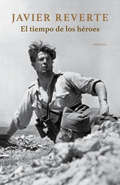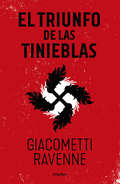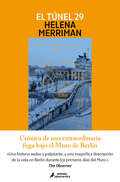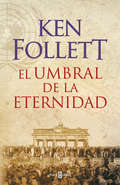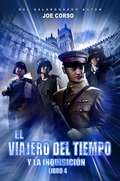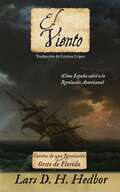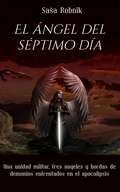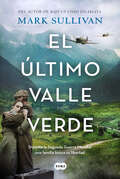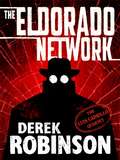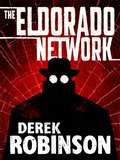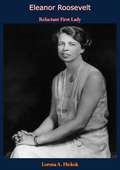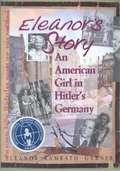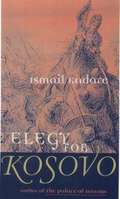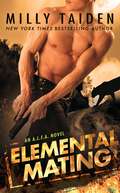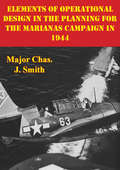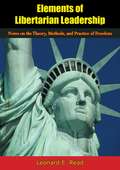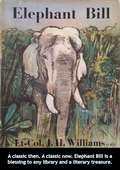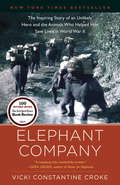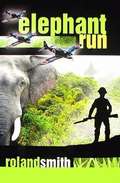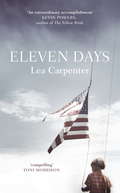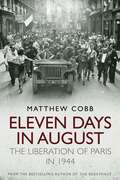- Table View
- List View
El tiempo de los héroes
by Javier ReverteLa biografía novelada de Juan Modesto, uno de los jefes de las milicias comunistas, recoge toda la épica y la tragedia de la Guerra Civil española. Una de las mejores historias escritas sobre el conflicto. Por Javier Reverte. Marzo de 1939. A punto de caer Madrid y tras las derrotas del río Ebro y Cataluña, el ejército republicano se desploma mientras las tropas franquistas avanzan hacia Levante, a la conquista de los últimos bastiones de la Segunda República. En el pueblo de Petrel (Alicante), el gobierno de Juan Negrín y buena parte de los dirigentes del Partido Comunista preparan su salida de España. Y hasta allí llega el general Juan Modesto para organizar, junto con otros jefes militares republicanos, la evacuación del gobierno. Son los últimos días de la guerra y los recuerdos se agolpan en la mente de Modesto. Por su memoria desfilan los días de su infancia, las alegres jornadas del Madrid que resistía el avance del fascismo, sus amores, los combates del Quinto Regimiento y de las Brigadas Internacionales, todas las batallas que le convertirían en una leyenda: el Jarama, Brunete, Belchite, Teruel, el Ebro, Cataluña... El Juan Modesto de la realidad histórica se convierte, en esta novela, en un personaje que alcanza la dimensión de los guerreros de antaño, de los héroes clásicos.
El triunfo de las tinieblas (Trilogía Sol negro #Volumen 1)
by Jacques Ravenne Eric GiacomettiLos nazis recorren el mundo en busca de cuatro reliquias que convertirán el Tercer Reich en un poder milenario. El eterno combate entre el Bien y el Mal. Tíbet, enero de 1939. Una expedición de las SS se apodera de una esvástica tallada en un metal desconocido. Es una de las reliquias que simbolizan los cuatro elementos: fuego, aire, agua y tierra. Según una antigua profecía, quien los posea se convertirá en el amo del mundo. España, enero de 1939. Tristán, aventurero y traficante de arte francés unido a la causa republicana participa junto con un grupo de soldados en el saqueo del monasterio de Montserrat. Poco después del final de la guerra acabará en una celda franquista donde un poderoso oficial alemán, el responsable de la Anhenerbe, le propone un trato. Inglaterra, 1940. El comandante Malorley, agente del nuevo servicio secreto británico, organiza una operación para impedir que los nazis consigan las reliquias. La lucha entre la «Estrella» y la «Esvástica», que determinará el resultado de la Segunda Guerra Mundial, se pone en marcha. Reseñas:«El libro que tienen en las manos es una novela pero está inspirada en numerosos hechos tan reales como sorprendentes. Están a punto de descubrir que la realidad supera la ficción.»Éric Giacometti/Jacques Ravenne «Una novela increíblemente fascinante.»Aujourd'hui «Una novela impregnada de la historia oculta de la Segunda Guerra Mundial.»Aujourd'hui «El arca perdida de Indiana Jones, El libro del rey de Indridasson y una novela de espías a lo John Le Carré. Empieza la aventura.»Le Point «Los delirios místicos de Hitler, la cuna de la raza aria, un tesoro oculto que otorgará poder absoluto a quien lo encuentre, reliquias cátaras y una joven en peligro.»Le Point
El triunfo de las tinieblas (Trilogía Sol negro #Volumen 1)
by Jacques Ravenne Eric GiacomettiLos nazis recorren el mundo en busca de cuatro reliquias que convertirán el Tercer Reich en un poder milenario. El eterno combate entre el Bien y el Mal. Tíbet, enero de 1939. Una expedición de las SS se apodera de una esvástica tallada en un metal desconocido. Es una de las reliquias que simbolizan los cuatro elementos: fuego, aire, agua y tierra. Según una antigua profecía, quien los posea se convertirá en el amo del mundo. España, enero de 1939. Tristán, aventurero y traficante de arte francés unido a la causa republicana participa junto con un grupo de soldados en el saqueo del monasterio de Montserrat. Poco después del final de la guerra acabará en una celda franquista donde un poderoso oficial alemán, el responsable de la Anhenerbe, le propone un trato. Inglaterra, 1940. El comandante Malorley, agente del nuevo servicio secreto británico, organiza una operación para impedir que los nazis consigan las reliquias. La lucha entre la «Estrella» y la «Esvástica», que determinará el resultado de la Segunda Guerra Mundial, se pone en marcha. Reseñas:«Una entretenidísima búsqueda a lo Indiana Jones de objetos mágicos para ganar la Segunda Guerra Mundial. Un thriller de primera sobre la arqueología nazi y las obsesiones sobrenaturales de Himmler y las SS.»Jacinto Antón, El País «Entre Indiana Jones y John Le Carré.»Julie Malaure, Le Point «El libro que tienen en las manos es una novela pero está inspirada en numerosos hechos tan reales como sorprendentes. Están a punto de descubrir que la realidad supera la ficción.»Éric Giacometti/Jacques Ravenne «Una novela increíblemente fascinante.»Aujourd'hui «Una novela impregnada de la historia oculta de la Segunda Guerra Mundial.»Aujourd'hui «El arca perdida de Indiana Jones, El libro del rey de Indridasson y una novela de espías a lo John Le Carré. Empieza la aventura.»Le Point «Los delirios místicos de Hitler, la cuna de la raza aria, un tesoro oculto que otorgará poder absoluto a quien lo encuentre, reliquias cátaras y una joven en peligro.»Le Point
El túnel 29: Crónica de una extraordinaria fuga bajo el Muro de Berlín
by Helena MerrimanCrónica de una extraordinaria fuga bajo el Muro de Berlín. «Una historia audaz y palpitante, y una magnífica descripción de la vida en Berlín durante los primeros días del Muro.»The Observer Construido en 1961 para impedir el éxodo de ciudadanos de la República Democrática Alemana al sector aliado de la ciudad, el Muro de Berlín fue testigo de numerosos intentos frustrados que pagaron con la cárcel, e incluso con su vida, quienes trataron de atravesarlo, convirtiéndose en un símbolo universal de la oprobiosa impotencia de un régimen totalitario. A partir de incontables horas de entrevistas con los supervivientes, y miles de documentos provenientes de los archivos de la Stasi, Helena Merriman reconstruye de forma pormenorizada una página de la historia reciente tan asombrosa que supera con creces a la mejor obra de ficción. El plan parecía desafiar tanto a la sensatez como a la geografía: construir un túnel para ayudar a los alemanes orientales a escapar por debajo de la llamada «franja de la muerte», el paso más fuertemente custodiado por guardias fronterizos y perros pastores alsacianos, y hacerlo en un suelo arcilloso entre corrientes de aguas. Sin embargo, en el verano de 1962 un grupo de valerosos excavadores, liderados por el joven estudiante de ingeniería Joachim Rudolph, que había conseguido huir de la RDA un año antes, logró lo imposible: cavar una angosta galería de ciento treinta y cinco metros de longitud entre una fábrica en el oeste y el sótano de un edificio abandonado en el este. Una proeza que ni los agentes infiltrados ni los espías de la Stasi pudieron impedir, y que permitió que veintinueve personas, entre hombres, mujeres y niños, hallaran la libertad. Con un ritmo trepidante, propio de las mejores novelas de espionaje, El túnel 29 no es sólo una detallada crónica de la historia alemana desde la Segunda Guerra Mundial hasta la época del Berlín dividido, sino también un emocionante relato de amor, lealtad y traición. La crítica ha dicho...«Además de una lectura apasionante, como una novela de John le Carré, quizá el gran valor del libro es dibujar un mundo, el de la RDA, que tiene muchas reminiscencias en el mundo actual.»Ara «Una obra sensacional, más absorbente que cualquier thriller. [...] Una historia formidable.»The Times «Un libro que te atrapa. [...] Perfectamente estructurado, hace justicia a la extraordinaria valentía de sus protagonistas.»The Economist «Un relato admirable, magníficamente escrito, muy gratificante.»BBC History Magazine «Una reconstrucción deslumbrante de una valerosa fuga de un régimen represivo.»Kirkus Reviews «Cautivador, escalofriante. [...] Una crónica admirable sobre lo que ocurre cuando las personas pierden la libertad.»New York Journal of Books «Una combinación que funciona: un protagonista rebosante de energía, intriga, espías, engaños y un amor dividido. El resultado: El túnel 29 resiste la comparación con los mejores thrillers de espionaje ambientados en la Guerra Fría.»Sunday Business Post
El umbral de la eternidad (The Century #Volumen 3)
by Ken FollettEl umbral de la eternidad cierra esta gran trilogía y la crónica de un siglo turbulento. En ella vivimos la historia íntima y personal de tres generaciones de cinco familias cuyas vidas estuvieron marcadas por dos guerras mundiales, la Revolución rusa, la Guerra Civil española y la Guerra Fría, junto con los profundos cambios sociales que las acompañaron. Tercer volumen de la trilogía «The Century» En el año 1961 Rebecca Hoffmann, profesora en Alemania del Este y nieta de Lady Maud, descubrirá que la policía secreta está vigilándola. Mientras, su hermano menor, Walli, sueña con huir a Occidente para convertirse en músico de rock. Por otro lado, Georges Jakes, un joven abogado que trabaja con los hermanos Kennedy, es un activista del movimiento por los derechos civiles de los negros en Estados Unidos que participará en las protestas de los estados del Sur y en la marcha sobre Washigton liderada por Martin Luther King. En Rusia las inclinaciones políticas enfrentan a los hermanos Tania y Dimka Dvorkin. Este se convierte en una de las jóvenes promesas del Kremlin mientras su hermana entrará a formar parte de un grupo activista que promueve la insurrección. A través de escenas impactantes y protagonistas fascinantes, Ken Follett nos presenta un mundo que pensábamos conocer pero que nunca más nos parecerá lo mismo. «La trilogía "The Century" es la historia de mis abuelos y de los vuestros, de nuestros padres y de nuestras propias vidas. De alguna forma es la historia de todos nosotros.»Ken Follet La crítica ha dicho...«Fascinante... fluye con un dramatismo que te engancha y de un ritmo magistral, hazañas de personajes, histrionismo familiar e intriga internacional.»The New York Daily News
El viajero del tiempo y la Inquisición (Libro #4)
by Joe Corso Mª Carmen OliveroDejemos que Lucky Campo descubra algo nuevo sobre sus habilidades. Dejemos que los chinos encuentren ésto como algo de extraordinario valor para su país. Lo que comenzó como algo bueno se ha convertido en una maldición. Parece que la vida de Lucky está llena de sorpresas y el dilema ahora es saber cómo tratarlas a todas. El amor de su vida vive en una época diferente, mientras Lucky sigue disfrutando de los lujos del presente. La Inquisición está a punto de sellar esos pensamientos. Los sacerdotes españoles no entienden nada acerca de Lucky, el mago del rey. Mientras las plagas siguen avanzando, se convencen más y más de su brujería. La vieja banda todavía sigue con Lucky y como siempre, le guardan las espaldas, pero ¿queda tiempo suficiente? ¿Pueden superar las brutales tácticas de Quiang Shan, el director de la Policía Secreta China? ¿Quién es el que traicionó a Lucky? Y ¿dónde está la princesa? Viajaremos desde los dinosaurios a las piramides y de ahi a la Inglaterra del siglo XII y de vuelta a Astoria. Ah, querida vieja Astoria. La vida nunca es aburrida con Lucky mientras viaja a través de los portales del tiempo.
El viento: Cuentos de una revolución - Oeste de Florida (Cuentos de una revolución #6)
by Lars D. H. HedborOeste de Florida, 1779 ¡Cómo salvó España la Revolución Americana! Gabriel es un simple marinero, que cumple las órdenes de su Capitán y Rey, cuando se ve arrastrado por una tormenta que cambia su vida de formas que nunca podría haber anticipado. Carlotta añora su hogar perdido y está buscando a su marido perdido, pero ambos permanecen esquivos en un mundo que ha sido puesto patas arriba por fuerzas que escapan a su control. Cuando la tormenta que es el gobernador Bernardo de Gálvez se desate sobre ambos, ninguno volverá a ser el mismo, ni tampoco su mundo. El Viento se desarrolla en la colonia de Oeste de Florida que a menudo se pasa por alto de la serie Cuentos de una Revolución, en la que cada novela independiente examina la Guerra de la Independencia de los Estados Unidos a medida que se desarrollaba en una colonia diferente. Si te gustan las historias fascinantes de partes olvidadas de la historia familiar, te encantará El Viento. ¡Obtenga su copia de El Viento hoy y obtenga una nueva apreciación del alcance de la Revolución Americana!
El ángel del séptimo día
by Saša RobnikAquel cuyo nombre no será mencionado, en su desvarío, propone al Creador el apocalipsis en la tierra para resolver de una vez por todas a quién pertenecerá. Para sorpresa de sus ángeles, el Señor acepta, pero bajo ciertas condiciones, y envía a los arcángeles Miguel y Gabriel a la tierra para que vigilen el arreglo acordado. Un selecto grupo de control, los empleados de una gasolinera en la autopista, tendrán un papel protagonista durante el apocalipsis, por lo que son objeto de especial atención por parte de las fuerzas del mal, pero también de los arcángeles, que tratan de evitar cualquier incumplimiento de contrato o mezquindad por parte de los competidores. Naturalmente, van a tener las de perder. También lo hará el ejército, que intenta en vano reprimir la invasión de cientos de millones de bestias del infierno. ¿Será el mal el que tenga éxito? ¿Es la mezquindad más fuerte que la bondad? Nuestros protagonistas, con un poco de ayuda de los ángeles, conseguirán desbaratar todas las insidias y trampas de las fuerzas del mal y salvar a la humanidad, lo podrás leer en esta aventurera y épica novela.
El último regalo de Villa
by Carmen Olivas"Entonces comprendí por qué llamaban a Villa el Centauro: hombre y bestia eran una sola cosa, fundidos por la rabia y el valor". Valentín. Valentín, con solo doce años, le hace una promesa a su madre en su lecho de muerte: ir en busca de su padre, quien, unos años antes, se unió a las filas villistas. La División del Norte pasa por el pueblo del muchacho y éste, en un arranque de valentía, se acerca sin dudarlo al mismísimo Centauro. Comienza así un periplo de aventuras y aprendizajes, en el que Valentín deberá demostrar que ha entrado, aunque a marchas forzadas, en la edad adulta. ¿Encontrará a su progenitor? ¿Comprenderá el valor de alzarse en armas por la causa revolucionaria? ¿Cuál será el detino de la bola en esos últimos días aciagos en el norte del país? A través de la mirada entrañable del propio Valentín, iremos conociendo sus pugnas internas, miedos y arrebatos, así como a un Pancho Villa más humano, quien, además de general, fue un padre para todos aquellos que lucharon por la Revolución.
El último valle verde
by Mark SullivanDel autor de Bajo un cielo escarlata, una nueva novela histórica inspirada por la increíble historia de coraje y supervivencia de una familia para escapar de Ucrania durante la Segunda Guerra Mundial. A finales de marzo de 1944, a medida que las tropas soviéticas se adentran en Ucrania, Emil y Adeline Martel se ven obligados a tomar una agónica decisión: ¿deben esperarlas y arriesgarse a ser enviados a Siberia? ¿O seguir a regañadientes a los peligrosos oficiales nazis que han jurado protegerlos? Los Martel son una de las muchas familias de ascendencia alemana cuyos antepasados han trabajado la tierra en Ucrania durante más de un siglo. Pero tras vivir bajo el régimen de terror de Stalin, la joven pareja decide que su mejor opción es huir en retirada junto a los nazis, a los que desprecian, para escapar de los soviéticos en busca de su libertad. Atrapados entre dos fuerzas en lucha y enfrentados a terribles dificultades para lograr su objetivo de llegar al oeste, la historia de los Martel es un emocionante, desgarrador y, finalmente, esperanzador relato que ilumina el extraordinario poder del amor y de los sueños y la increíble voluntad de sobrevivir de una familia. Sobre la novela han dicho:«¡Mark Sullivan lo ha vuelto a lograr! El último valle verde es una absorbente e inspiradora historia de heroísmo y coraje en los oscuros días al final de la Segunda Guerra Mundial».Kristin Hannah, autora de El Ruiseñor «Mark Sullivan entreteje historia y memoria en un épico viaje de amor y resiliencia. Uno de los libros más fascinantes y adictivos que he leído en mucho tiempo».Heather Morris, autora de El tatuador de Auschwitz «Sullivan demuestra de nuevo su don para encontrar rescoldos de historia poco conocidos e insuflarles vida hasta que brillan y resplandecen de un modo emocionante y a la vez memorable».Pam Jenoff, autora de El vagón de los huérfanos «Tras su exitosa novela Bajo un cielo escarlata, Mark Sullivan llega con otra deslumbrante proeza. El último valle verde noveliza una inspiradora historia real de fortaleza, fe y resistencia».Authorlink «Sullivan tiene una extraordinaria imaginación que se une a un verdadero talento para crear escenas realistas, tanto de estremecedores episodios de peligro como de íntimos momentos de dolor».Historical Novel Society «Si te gustan las novelas históricas, esta es una de las mejores que se publicarán este año... o cualquier año».Red Carpet Crash «Una lectura simplemente cautivadora de la primera a la última página».Midwest Book Review «Mark Sullivan lo ha vuelto a conseguir: toma historias muy reales y muy humanas ambientadas en el periodo más intenso de la historia reciente y nos ofrece una novela histórica que tardaremos mucho en olvidar».Bookreporter
Eldorado Network
by Derek Robinson1941. Hitler is rampant. Spain is neutral. Madrid, like Casablanca, the launching pad for spies from all sides. The most daring and audacious of all is codenamed "Eldorado".Young, inexperienced, hotheaded, he had no right to survive, let alone succeed. Now his network is the most valuable in Europe, and the fates of armies lie in his hands.But who does he work for? Or is he only in it for himself? One thing's for sure. War may be a dirty business, but it certainly brings home the bacon.Based on a true story, The Eldorado Network is the first novel in Derek Robinson's acclaimed Luis Cabrillo Quartet. A tense and gripping espionage thriller from a master of action and suspense.
Eldorado Network
by Derek Robinson1941. Hitler rampant. Spain neutral. Madrid, like Casablanca, the launching pad for spies from all sides. The most daring and audacious is codenamed 'Eldorado'. Young, inexperienced, hotheaded, he had no right to survive, let alone succeed. Now his network is the most valuable in Europe, and the fates of armies lie in his hands.But who does he work for? Or is he only in it for himself? One thing's for sure. War may be a dirty business, but it certainly brings home the bacon. Based on a true story, The Eldorado Network is the first novel in Derek Robinson's acclaimed Luis Cabrillo Quartet. A tense and gripping espionage thriller from a master of action and suspense.
Eldorado Network
by Derek Robinson1941. Hitler rampant. Spain neutral. Madrid, like Casablanca, the launching pad for spies from all sides. The most daring and audacious is codenamed 'Eldorado'. Young, inexperienced, hotheaded, he had no right to survive, let alone succeed. Now his network is the most valuable in Europe, and the fates of armies lie in his hands.But who does he work for? Or is he only in it for himself? One thing's for sure. War may be a dirty business, but it certainly brings home the bacon. Based on a true story, The Eldorado Network is the first novel in Derek Robinson's acclaimed Luis Cabrillo Quartet. A tense and gripping espionage thriller from a master of action and suspense.
Eleanor Roosevelt: Reluctant First Lady
by Lorena A. HickokLORENA HICKOK is in a unique position to write the story of Eleanor Roosevelt’s transition from a private individual to First Lady of the land. As a newspaper reporter, she had known Mrs. Roosevelt since Al Smith’s campaign for President, and she was assigned by the Associated Press to cover her during her husband’s presidential campaign in 1932. With this new assignment, the two shortly became, as they have remained, very good friends.The author was at Mrs. Roosevelt’s side throughout the momentous days of the campaign, election and inauguration. A frequent guest at the White House, she witnessed the adjustment of its new mistress to the occupancy of that residence. Together, they took the last trips that Mrs. Roosevelt attempted in a vain effort to preserve her anonymity. Reluctant First Lady gives a fascinating and heart-warming insight into the problems and sacrifices that confront an active private citizen, wife and mother, whose husband becomes President of the United States.
Eleanor's Story: An American Girl In Hitler's Germany
by Eleanor Ramrath GarnerA COMPELLING AND EVOCATIVE story that immerses readers in the daily struggles of surviving World War II. Eleanor's Story is the dramatic autobiography of Eleanor Ramrath Garner's youth, growing up as an American caught in World War II Berlin. It's a story of trying to maintain stability, hope, and identity in a world of terror and contrasts. During the Great Depression, when she is nine, Eleanor's family moves from her beloved America to Germany, where her father has been offered a good job. But war breaks out as her family is crossing the Atlantic, and they cannot return to the United States. Eleanor tries to maintain her American identity as she feels herself pulled into the turbulent life roiling around her. She fervently hopes for an Allied victory, yet for years she must try to survive the Allied bombs shattering her neighborhood. Her family faces separations, bombings, hunger, the final fierce battle for Berlin, the Russian invasion, and the terrors of Soviet occupancy. This compelling story immerses us in the daily struggles of surviving World War II as a civilian. It puts a very human face on the horrors of war and helps us understand that each casualty of war is a person, not a number.
Elegy for Kosovo: Stories
by Peter Constantine Ismail KadareJune 28, 1389: Six hundred years before Serbian leader Slobodan Milosevic called for the repression of the Albanian majority in Kosovo, there took place, on the Field of the Blackbirds, a battle shrouded in legend. A coalition of Serbs, Albanian Catholics, Bosnians, and Rumanians confronted and fell to the invading Ottoman army of Sultan Murad. The battle established the Muslim foothold in Europe and became a centerpiece of Serbian nationalist ideology, justifying the campaign of ethnic cleansing of Albanian Kosovars that the world witnessed with horror at the end of the last century. In this eloquent and timely reflection on war, memory, and the destiny of two peoples, Ismail Kadare explores in fiction the legend and the consequences of that defeat. Elegy for Kosovo is a heartfelt yet clear-eyed lament for a land riven by hatreds as old as the Homeric epics and as young as the latest news broadcast.
Elegy on Kinderklavier (Linda Bruckheimer Series In Kentucky Literature Ser.)
by Arna Bontemps Hemenway<P>The stories in Elegy on Kinderklavier explore the profound loss and intricate effects of war on lives that have been suddenly misaligned. <P>A diplomat navigates a hostile political climate and an arranged marriage in an Israeli settlement on a newly discovered planet; a small town in Kansas shuns the army recruiter who signed up its boys as troops are deployed to Iraq, falling in helicopters and on grenades; a family dissolves around mental illness and a child's body overtaken by cancer. <P>The moment a soldier steps on an explosive device is painfully reproduced, nanosecond by nanosecond. <P> Arna Bontemps Hemenway's stories feel pulled out of time and place, and the suffering of his characters seem at once otherworldly and stunningly familiar. <P>Elegy on Kinderklavier is a disquieting exploration of what it is to lose and be lost.Arna Bontemps Hemenway's fiction has appeared in The Missouri Review, A Public Space, the Seattle Review, and Ecotone. Originally from Kentucky, he holds an MFA from the Iowa Writers' Workshop, and has received scholarships from the Sewanee Writers' Conference and Truman Capote Literary Trust.
Elemental Mating
by Milly TaidenTheir existence was a secret the government stumbled upon. In exchange for continued autonomy, the paranormals entered an alliance with the government. Now they are A.L.F.A.: Alpha League Federal Agency, sworn to protect and serve humanity.Brilliant scientist Melinda Caster has discovered a new strain of the Zika virus that stimulates synaptic growth in embryos, causing neuron development beyond normal human levels. Way beyond, like ESP-levels of cognitive abilities. When the lab is broken into, Melinda realizes that someone has been keeping tabs on her research and wants it for themselves. A happy accident destroys critical data before it can fall into the wrong hands, but unfortunately that makes Melinda and her perfect memory a target. A.L.F.A sends in jaguar-shifter Agent Parish Hamel to discover who is after the virus and why. The beautiful scientist acts like catnip to his senses and throws his mating instincts into overdrive. And then she disappears along with the only sample of the virus…. Now Parish must canvas the darkest areas of the supernatural underground to rescue Melinda, and what he discovers is beyond a paranormal’s worst nightmare.
Elements Of Operational Design In The Planning For The Marianas Campaign In 1944
by Major Chas. J. SmithOperational art and the operational level of war became a doctrinal focus for the U.S. Army in the 1980s. This focus led to the development of the elements of operational design. These concepts are not new, and were developed in the interwar period prior to World War II at the staff and war colleges. During this time, however, the military did not doctrinally recognize the operational level or war or operational art. Even though the concepts were not recognized, the intellectual process permeated the officer education system prior to World War II. Clearly, American officers in World War II used something of operational art, including in the planning and execution of the Marianas Campaign. This monograph looks at the question in more detail, by testing the extent to which planners within CENPAC used the elements of operational design in the Marianas Campaign, including end state and objectives, effects, center(s) of gravity, decisive points, direct and indirect action, lines of operation, operational reach, simultaneity and depth, timing and tempo, leverage, balance, anticipation, culmination, and arranging operations. The implication of this study is that as current doctrine evolves, the development, education, and execution of operational concepts in the World War II era continue to be useful.
Elements of Libertarian Leadership: Notes on the Theory, Methods, and Practice of Freedom
by Leonard E. ReadIn this book, first published in 1962, the author and founder of the Foundation for Economic Education, Leonard E. Read, skilfully organizes his numerous, previously published FEE materials into a single, usable manual “for those who would give liberty a hand.”“The emphasis in this volume is on methodology. Assuming an individual has mastered the philosophical aspects of freedom, what can he do about it? With whom does he work? What are his limitations? His potentialities?”—Leonard E. Read, Foreword
Elephant Bill
by Lt.-Col. J. H. Williams O.B.E.A book comes along like this once in a lifetime. You read it as a small child, or even an adult, and never forget the images it conjures up of a wonderful Englishman who lives in the mysterious forests of faraway Burma and of the kind native people who teach him about their lovely country. But most of all, you never forget the elephants! For this is a story about those magnificent creatures. Though he was officially known as Lt. Colonel J. H. Williams, the author was known to the world at large as Elephant Bill. That is because he spent 25 years living with the elephants in the mountains and forests of Burma. There he trained them to haul teak logs out of the isolated jungles.Yet this is also a story of great courage, because when the Second World War struck it also came to Burma. The Japanese Imperial Army planned to confiscate the Burmese elephants, drafting them to make the bridges and railways they needed to invade India. When he learned of these plans to put his beloved animals to a war-like purpose, Elephant Bill knew what had to be done. The mighty kings of the jungle had to be evacuated to safety.This is thus the story not only of the peaceful days in the jungle, starting in 1921, but also the story of the largest elephant rescue in history. It tells the amazing account of how Elephant Bill, along with his friends and family, rode 45 of the great beasts across the mountains of Burma, before reaching safety in faraway India.A classic then. A classic now. Elephant Bill is a blessing to any library and a literary treasure.
Elephant Company: The Inspiring Story of an Unlikely Hero and the Animals Who Helped Him Save Lives in World War II
by Vicki Constantine CrokeThe remarkable story of James Howard “Billy” Williams, whose uncanny rapport with the world’s largest land animals transformed him from a carefree young man into the charismatic war hero known as Elephant Bill<P> Billy Williams came to colonial Burma in 1920, fresh from service in World War I, to a job as a “forest man” for a British teak company. Mesmerized by the intelligence, character, and even humor of the great animals who hauled logs through the remote jungles, he became a gifted “elephant wallah.” Increasingly skilled at treating their illnesses and injuries, he also championed more humane treatment for them, even establishing an elephant “school” and “hospital.” In return, he said, the elephants made him a better man. The friendship of one magnificent tusker in particular, Bandoola, would be revelatory. In Elephant Company, Vicki Constantine Croke chronicles Williams’s growing love for elephants as the animals provide him lessons in courage, trust, and gratitude.<P> But Elephant Company is also a tale of war and daring. When Imperial Japanese forces invaded Burma in 1942, Williams joined the elite Force 136, the British dirty tricks department, operating behind enemy lines. His war elephants would carry supplies, build bridges, and transport the sick and elderly over treacherous mountain terrain. Now well versed in the ways of the jungle, an older, wiser Williams even added to his stable by smuggling more elephants out of Japanese-held territory. As the occupying authorities put a price on his head, Williams and his elephants faced his most perilous test. In a Hollywood-worthy climax, Elephant Company, cornered by the enemy, attempted a desperate escape: a risky trek over the mountainous border to India, with a bedraggled group of refugees in tow. Elephant Bill’s exploits would earn him top military honors and the praise of famed Field Marshal Sir William Slim.<P> Part biography, part war epic, and part wildlife adventure, Elephant Company is an inspirational narrative that illuminates a little-known chapter in the annals of wartime heroism.
Elephant Run
by Roland SmithIn 1941, bombs drop from the night skies of London, demolishing the apartment Nick Freestone lives in with his mother. Deciding the situation in England is too unstable, Nick's mother sends him to live with his father in Burma, hoping he will be safer living on the family's teak plantation. But as soon as Nick arrives, trouble erupts in the remote Burmese elephant village. Japanese soldiers invade, and Nick's father is taken prisoner. Nick is left stranded on the plantation, forced to work as a servant to the new rulers. As life in the village grows more dangerous for Nick and his young friend, Mya, they plan their daring escape. Setting off on elephant back, they will risk their lives to save Nick's father and Mya's brother from a Japanese POW camp.
Eleven Days
by Lea CarpenterLONGLISTED FOR THE BAILEYS WOMEN'S PRIZE FOR FICTION 2014'SUPERB' - SIMON SEBAG MONTEFIORE, LONDON EVENING STANDARD BOOKS OF THE YEAR 2013'EXTRAORDINARY' - KEVIN POWERS, AUTHOR OF THE YELLOW BIRDS'THINK HOMELAND IN FICTION FORM...' - RED'AN EXTRAORDINARILY GIFTED WRITER' - MICHIKO KAKUTANI, NEW YORK TIMESEleven Days is, at its heart, the story of a mother and a son.It begins in May 2011: Sara's son Jason has been missing for nine days in the aftermath of a special operations forces mission. Out of devotion to him, Sara has made herself knowledgeable about things military, but she knows nothing more about her son's disappearance than the press corps camped out in her driveway. In a series of flashbacks we learn about Jason's absentee father - a man who died, according to "insiders," helping to make the country safer - and Jason's decision to join the U.S. Naval Academy at Annapolis after 9/11 and enter into the toughest military training in the world: for the U.S. Naval Special Warfare's Navy SEAL Teams. Through letters Jason wrote his mother while training, we see him becoming a strong, compassionate leader. But his fate will be determined by events that fall outside the sphere of his training, and far outside the strong embrace of his mother's love. As well as a touching picture of the bond between a mother and a son this is a unique look into the training, history and culture of one of the world's elite forces. Page-turning and haunting, this is an astonishing debut which questions the very nature of sacrifice and love.
Eleven Days in August: The Liberation of Paris in 1944
by Matthew Cobb'I had thought that for me there could never again be any elation in war. But I had reckoned without the liberation of Paris - I had reckoned without remembering that I might be a part of that richly historic day. We were in Paris on the first day - one of the great days of all time.' (Ernie Pyle, US war correspondent)The liberation of Paris was a momentous point in twentieth-century history, yet it is now largely forgotten outside France. Eleven Days in August is a pulsating hour-by-hour reconstruction of these tumultuous events that shaped the final phase of the war and the future of France, told with the pace of a thriller. While examining the conflicting national and international interests that played out in the bloody street fighting, it tells of how, in eleven dramatic days, people lived, fought and died in the most beautiful city in the world. Based largely on unpublished archive material, including secret conversations, coded messages, diaries and eyewitness accounts, Eleven Days in August shows how these August days were experienced in very different ways by ordinary Parisians, Resistance fighters, French collaborators, rank-and-file German soldiers, Allied and French spies, the Allied and German High Commands.Above all, it shows that while the liberation of Paris may be attributed to the audacity of the Resistance, the weakness of the Germans and the strength of the Allies, the key to it all was the Parisians who by turn built street barricades and sunbathed on the banks of the Seine, who fought the Germans and simply tried to survive until the Germans finally surrendered, in a billiard room at the Prefecture of Police. One of the most iconic moments in the history of the twentieth century had come to a close, and the face of Paris would never be the same again.
